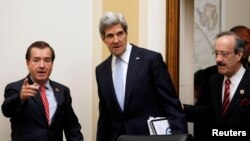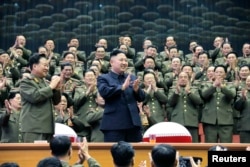STATE DEPARTMENT —
U.S. Secretary of State John Kerry said China is key to resolving the nuclear standoff with North Korea.
Briefing U.S. lawmakers on talks last week in Beijing, Seoul, and Tokyo, Secretary Kerry said resolving the standoff with North Korea peacefully depends largely on involving China.
"I think it's very clear from the last 15 or 20 years that the United States of America doesn't have direct influence with North Korea, other than the military threat," he said. "And that has huge risks and dangers with somebody as untested, as provocative, and who has already proven himself willing to be reckless over the course of the last months. China does have a relationship."
So Kerry said the United States, Russia, South Korea, and Japan are working with China to use its position as a significant source of food, finance and fuel to North Korea to bring about change.
"I think it's fair to say that without China, North Korea would collapse," Kerry added. "Therefore, I think it is important for us to work with China. And I think China has indicated its willingness to work with us."
But Kerry said Chinese authorities worry about North Korean instability because they know that, from a humanitarian point of view, they would have to deal with most of the problems.
"So hopefully diplomacy can actually work here," he said. "And that's they key - to work with the Chinese to change the equation that has had a bad-repetition syndrome of total reneging, of complete failure and of increased nuclearization. We have to try to change that."
North Korean leader Kim Jong Un repeatedly threatened to attack the United States and South Korea in the run-up to this week's 101st anniversary of the birthday of the North's late founder, Kim Il Sun.
U.S. President Barack Obama said Tuesday he expects more posturing and provocation by North Korea. He told a U.S. television network that while he does not believe North Korea has the capacity to mount a nuclear weapon on a ballistic missile, the United States is preparing for "every contingency.''
Pyongyang is issuing new threats against South Korea demanding an apology for anti-North Korean protests. North Korea is also rejecting U.S. overtures for talks, but a U.S. military official said North Korean leaders are looking for a way to cool down the charged rhetoric.
In his testimony before the House of Representatives Foreign Relations Committee, Kerry dismissed media reports that he offered to reduce U.S. missile defenses in Asia in exchange for Chinese help with North Korea. Instead, he said that since President Obama boosted those defenses following North Korean threats, it stands to reason that there may be a reduction if the situation eases.
Briefing U.S. lawmakers on talks last week in Beijing, Seoul, and Tokyo, Secretary Kerry said resolving the standoff with North Korea peacefully depends largely on involving China.
"I think it's very clear from the last 15 or 20 years that the United States of America doesn't have direct influence with North Korea, other than the military threat," he said. "And that has huge risks and dangers with somebody as untested, as provocative, and who has already proven himself willing to be reckless over the course of the last months. China does have a relationship."
So Kerry said the United States, Russia, South Korea, and Japan are working with China to use its position as a significant source of food, finance and fuel to North Korea to bring about change.
"I think it's fair to say that without China, North Korea would collapse," Kerry added. "Therefore, I think it is important for us to work with China. And I think China has indicated its willingness to work with us."
But Kerry said Chinese authorities worry about North Korean instability because they know that, from a humanitarian point of view, they would have to deal with most of the problems.
"So hopefully diplomacy can actually work here," he said. "And that's they key - to work with the Chinese to change the equation that has had a bad-repetition syndrome of total reneging, of complete failure and of increased nuclearization. We have to try to change that."
North Korean leader Kim Jong Un repeatedly threatened to attack the United States and South Korea in the run-up to this week's 101st anniversary of the birthday of the North's late founder, Kim Il Sun.
U.S. President Barack Obama said Tuesday he expects more posturing and provocation by North Korea. He told a U.S. television network that while he does not believe North Korea has the capacity to mount a nuclear weapon on a ballistic missile, the United States is preparing for "every contingency.''
Pyongyang is issuing new threats against South Korea demanding an apology for anti-North Korean protests. North Korea is also rejecting U.S. overtures for talks, but a U.S. military official said North Korean leaders are looking for a way to cool down the charged rhetoric.
In his testimony before the House of Representatives Foreign Relations Committee, Kerry dismissed media reports that he offered to reduce U.S. missile defenses in Asia in exchange for Chinese help with North Korea. Instead, he said that since President Obama boosted those defenses following North Korean threats, it stands to reason that there may be a reduction if the situation eases.











